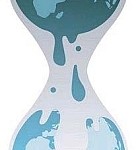 It is becoming abundantly clear that many long-standing pillars of human identity and endeavour are bursting at the seams. Most recently we have the announcement coming out of CERN that there may be particles that travel faster than light (something very much TBC, but the ramifications are astounding). Surrounding this discovery is the context of a global economic crisis that was never really dealt with, and now it’s ready to come back with a vengeance.
It is becoming abundantly clear that many long-standing pillars of human identity and endeavour are bursting at the seams. Most recently we have the announcement coming out of CERN that there may be particles that travel faster than light (something very much TBC, but the ramifications are astounding). Surrounding this discovery is the context of a global economic crisis that was never really dealt with, and now it’s ready to come back with a vengeance.
Combine this with the impact that something like WikiLeaks has had on the relationship between government, corporations and people; or in a more tangible sense the ongoing results of the ‘Arab Spring’ that is shifting political lines all over the Middle East. Even such visceral things such as how we conduct warfare are changing dramatically. All of this before we even get to the most pressing paradigm shift for most people: the changing of Facebook and their new timeline concept.
Each one of these would be impacting in its own right, and yet we are witnessing many of them occurring at the same time. The final result of this avalanche of paradigm shifts and the abolishment of so many of our sacred cows is still very much up in the air, and for the most part it seems we are all blindly trundling through it with no clear end-point in mind. Where we will end up, nobody knows, and all of this just at the beginning of the 21st century.
Of course, paradigm shifts are a natural part of the social evolution of humanity and have occurred throughout history – there is nothing new about having our world altered irrevocably by new information or the escalation of events. The difference that we will face in the 21st century, unlike any other that has come before, is that our ability to create and process new information is accelerating exponentially. When this is combined with the exponential growth in our ability to share sentiment and ideology, the basic recipe for increasingly regular systematic change is present here and now.
Amongst a lot of the chaos that these shifts are harbingers of, our ability to reconcile them with our old viewpoints and move forwards is what dictates how smoothly and comfortably any change is likely to occur. Without flexibility in this regard, we will face increasing turmoil and conflict on a global scale; and it could easily reach the point where the social contract breaks down entirely because the tools necessary to continue moving and creating in times of such rapid and all-encompassing change are not widely available.
What is required here is a more concerted effort to move beyond modern information and communication networks and back into areas of true engagement with society. Rapid change will not only be facilitated by our technology, but also our ability to properly process it within the structures of modern society and will depend on each of us understanding our own limitations and developing an openness to interact with the wider context of human diversity.
We must ensure that we do not hold stubbornly onto our own paradigm commitments, whatever context they might be in, if the data available – combined with collective sentiment based on philosophical discourse – points starkly to a new direction to be forged. This can occur across any field of study, for any model of behaviour or social structure, any concept of identity or even – as we approach an era of transhumanist possibility – our perception of what it means to be human. We cannot merely replace one stubborn commitment for another, but must move towards a more pluralistic understanding of the construction of reality and our creation of the role/s that we are able to play within it.
This extends beyond ourselves and out onto the larger organism of society that we collectively create, where the advantage of adaptability sits at the core of long-term survival and progression. This is not to be taken purely in an evolutionary-biological sense, since one of the major shifts to occur will be how we embrace a post-biological direction of human evolution. Rather, we must create a true and widespread sense that success and flourishing becomes increasingly available the more one is able to adapt their ideology quickly to an ever changing environment without completely abandoning their sense of identity of wellbeing. There is nothing easy at all about how we must respond to this unknown landscape of human endeavour; for it will rely upon a degree of measured behaviour based on principles of empathy and dialogue that has never manifested on a global scale at any point yet in human history.
 We must embrace change and yet at the same time ensure that those who cannot are not marginalised to the point of extinction. Let us not forget that in many instances (Facebook being the trivial, farcical example) these shifts impact us in the context of an existential crisis of mundane luxury – the domain of those that fate has blessed with being born into a lifestyle of relative comfort and possibility. Most of these paradigm shifts – consider here that of massive climate change – will have profound impacts on the truly marginalised and vulnerable around the world.
We must embrace change and yet at the same time ensure that those who cannot are not marginalised to the point of extinction. Let us not forget that in many instances (Facebook being the trivial, farcical example) these shifts impact us in the context of an existential crisis of mundane luxury – the domain of those that fate has blessed with being born into a lifestyle of relative comfort and possibility. Most of these paradigm shifts – consider here that of massive climate change – will have profound impacts on the truly marginalised and vulnerable around the world.
Let us never overlook in this blur of activity those who live in extreme poverty, often for no reason other than they are victims of circumstance; oppressed by the very systems that we rely upon for our own sense of peace and abundance. Large swathes of the global population may not even be explicitly aware of what is occurring on the global stage, but they will undoubtedly be greatly affected by the negative impact of such shifts if we allow them to overwhelm us through negligence, greed or narcissism. Hopefully we can see a collective impact on the global landscape that drastically reduces such instances of true and lasting hardship; but it can only come if we embrace those shifts which lead us closer to the ideals of empathy and compassion and reject those which promote a regression to tribalism, narrow-mindedness and exploitation.
Which is why it is vitally important, now more than ever, to become actively involved in the direction of humanity. We have access to more information, more communication and more inspiration than ever before; and yet so many of us are willingly distracted away from the possibility of creating change and instead buy into the visions of paradigm commitment and avoidance of responsibility that will challenge our very ability to survive the 21st century.
It is time to start paying attention, because if we don’t we will be subsumed by the changes brought about through our inattentive stumbling towards the future. True liberty requires true engagement with global society, helping to collectively shape and form our future according to the highest ideals of freedom and equality. This is not to chase some unattainable utopian ideal, but rather to recognise that where a potentiality exists for common good we must strive to actualise it. Human history has always been dynamic, but in the past it has been at a pace that the very structures of society can keep up with. The issue that we face, if we cannot develop a new ultra-adaptive framework of being on a global scale, is that we will become as a species irrelevant in our own history – consumed by our drive forwards until we no longer have any agency whatsoever.




